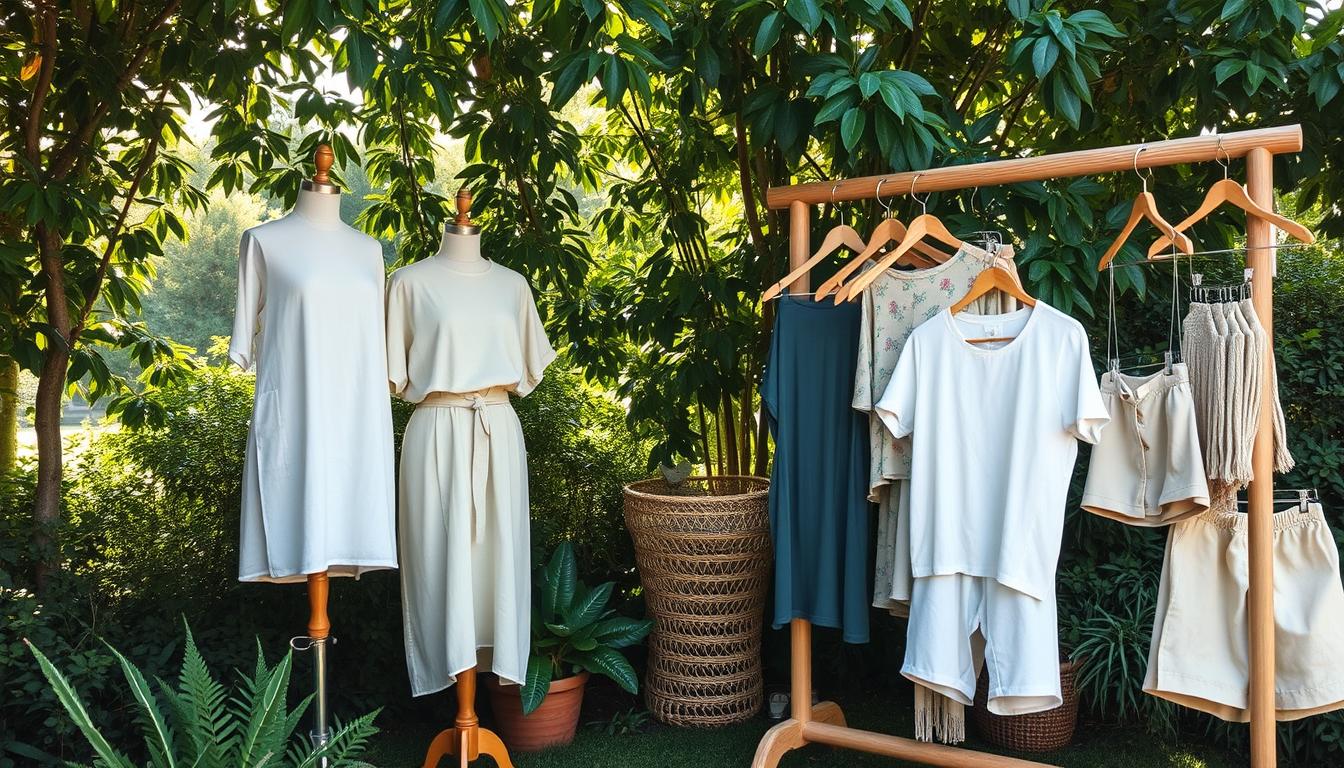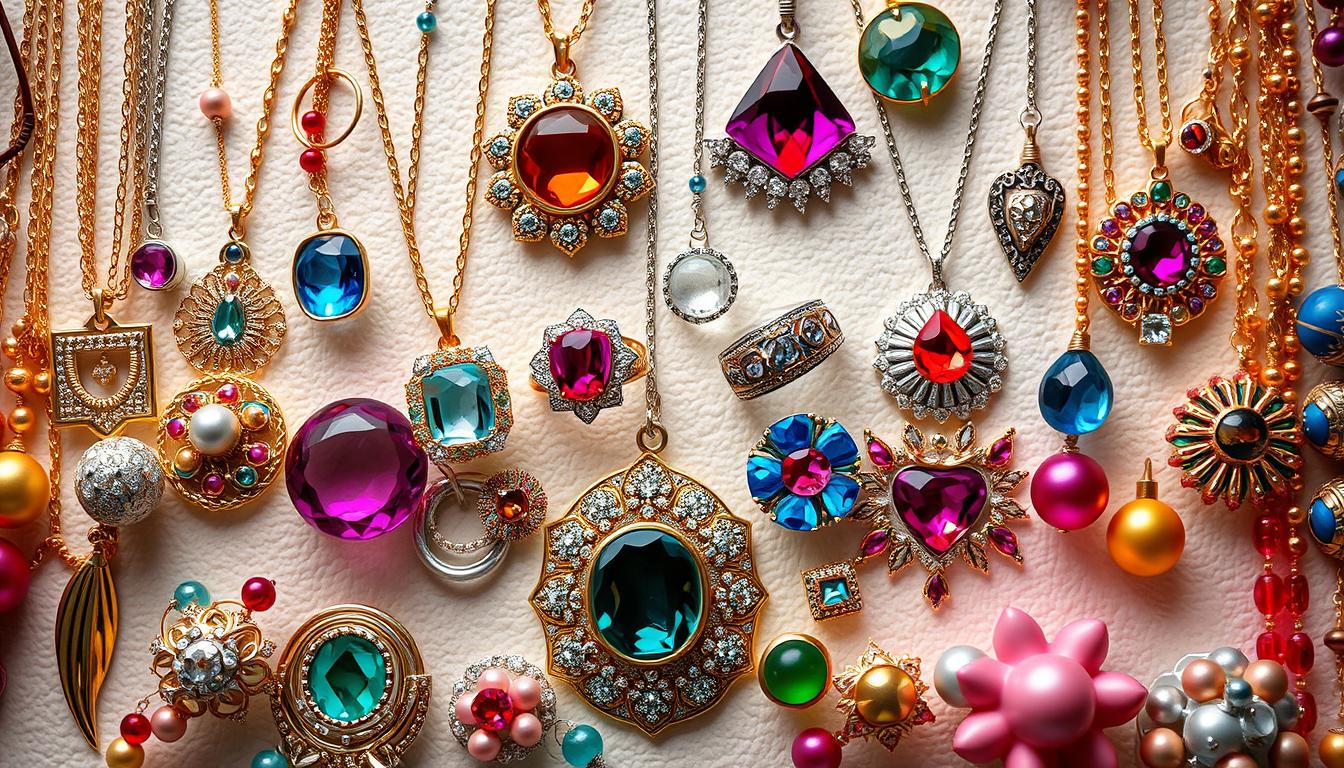We’re excited to share our guide on eco-friendly clothing options for everyday wear. This helps you make sustainable fashion choices that are stylish and good for the planet. As consumers, we can positively impact the planet by choosing eco-friendly clothes.
Finding eco-friendly clothing that fits your style is easier than ever. We’ll explore sustainable fashion and give tips on adding eco-friendly clothes to your daily wardrobe. This includes everything from casual wear to dress attire.
Our goal is to give you the knowledge and inspiration to make better fashion choices. By choosing eco-friendly clothes, you’ll reduce your environmental impact. You’ll also support brands that care about sustainability.
Introduction to Sustainable Fashion
In this article, we’ll dive into sustainable fashion. We’ll talk about the importance of eco-friendly clothing and give tips on sustainable fashion choices.
Key Takeaways
- Choose eco-friendly clothing options for everyday wear to reduce your environmental footprint
- Sustainable fashion is a growing trend that’s both stylish and environmentally conscious
- Eco-friendly clothing options are available for all aspects of your wardrobe, from casual wear to dress attire
- By choosing sustainable fashion, you’re supporting brands that prioritize the environment
- Making informed decisions about your fashion choices can contribute to a more sustainable future
The Importance of Eco-Friendly Clothing
We think it’s key to choose sustainable fashion to lessen the fashion industry’s environmental harm. As buyers, we can shape the market by picking clothes from brands that care about the planet. The fashion world is a big polluter, and fast fashion makes it worse.
Learning about sustainable fashion is a big step towards change. It means thinking about how our clothes affect the environment, people, and the economy. Every part of sustainable fashion tries to lessen harm to our planet. Important things to think about include:
- Material selection: Opt for organic, recycled, or sustainably sourced materials.
- Production process: Look for brands that treat workers fairly and cut down on waste.
- End-of-life disposal: Think about if clothes can be recycled or break down easily.
By making smart choices and backing eco-friendly brands, we help make fashion better for the planet. As we learn more about sustainable fashion, we’ll see how our choices affect the environment. We’ll also talk about why we need to choose eco-friendly clothes more often.
Remember, every little bit helps, and together we can make a big difference. By choosing sustainable fashion and supporting brands that care, we can make the fashion world better for our planet.
Materials That Make a Difference
We think the materials in clothes are key to their eco-friendliness. Choosing the right materials is vital for eco-friendly clothing. By picking clothes made from sustainable materials, we can help the planet.
Popular sustainable materials for eco-friendly clothing include:
- Organic cotton, grown without harmful chemicals
- Hemp, a strong material that needs less water and no pesticides
- Recycled polyester, made from plastic, cutting down on waste
These materials are good for the earth and for us. Organic cotton feels soft and breathes well. Hemp lasts long and needs less water. Recycled polyester cuts down on waste and saves resources.
By choosing eco-friendly clothing from sustainable materials, we help the planet. We can make a difference and support a greener fashion industry. Together, we can create a better future for our planet.
Brands Leading the Way in Eco-Friendly Fashion
We are inspired by eco-conscious clothing brands that focus on sustainability and ethics. These brands are changing the fashion industry. They make us think about how our clothes affect the planet.
Several brands are leading in ethical clothing for daily use. For example, Patagonia uses regenerative farming for cotton. Everlane is known for clear pricing and waste reduction. Eileen Fisher creates stylish, sustainable pieces with a focus on simplicity.
These eco-conscious brands have some key features:
- They use materials like organic cotton and recycled polyester.
- They work to reduce waste and carbon footprint.
- They are open about their pricing and production.
- They design clothes that are timeless and sustainable.
By choosing these brands, we can help the environment and look good doing it. As consumers, we can influence the fashion industry. We can support brands that care about sustainability and ethics.
Let’s support a more sustainable fashion industry. Let’s choose eco-friendly clothing and make smart choices about what we wear.
| Brand | Key Features |
|---|---|
| Patagonia | Regenerative farming, environmentally-friendly materials |
| Everlane | Transparent pricing, commitment to reducing waste |
| Eileen Fisher | Timeless and sustainable designs, simplicity in production |
Stylish Eco-Friendly Clothing Options for Women
We think eco-friendly clothes can be both stylish and good for the planet. Women have many choices in fashion that are sustainable. For example, there are flowy sundresses from organic cotton and activewear that’s comfy and performs well.
Brands like Patagonia and Eileen Fisher have lots of organic clothes for daily wear. These clothes are stylish and help the environment.
Some popular choices for women include:
- Dresses made from organic cotton or recycled materials
- Sustainable activewear for yoga, running, or other fitness activities
- Eco-friendly denim jeans and jackets
These options are great for women who want to look good and help the planet. By choosing eco-friendly clothes, we can lower our carbon footprint. This helps make the fashion industry more sustainable.
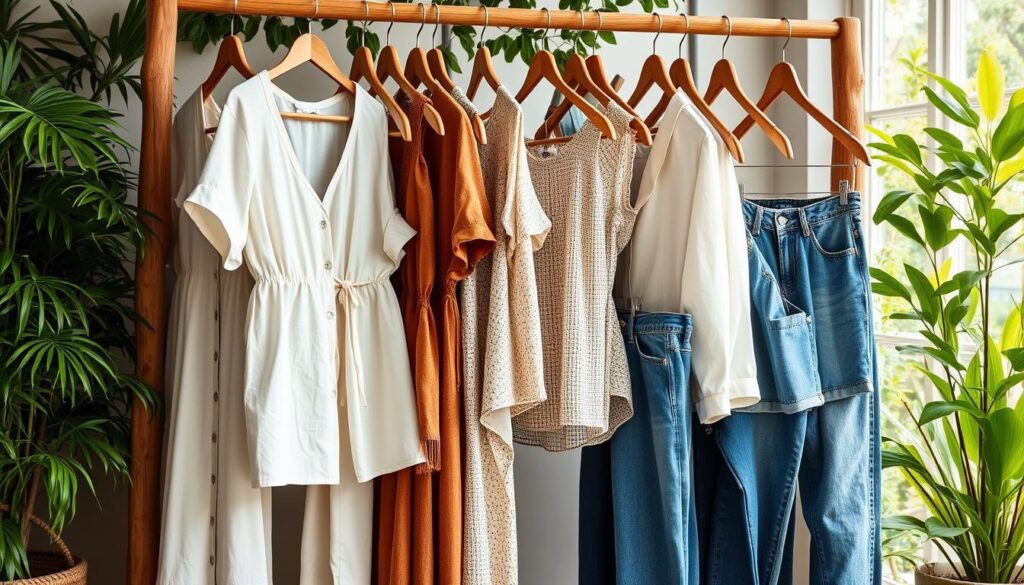
Whether we’re going to work or the gym, there’s an eco-friendly choice for us. Adding eco-friendly clothes to our wardrobes helps the planet. It also keeps us stylish and fashionable.
Eco-Friendly Clothing Options for Men
Green fashion for daily outfits is growing, and it’s not just for women. Men’s eco-friendly clothing is also becoming popular. Now, men can find sustainable and stylish options for any occasion.
For casual wear, start with eco-friendly tees and jeans. These items are good for the planet and feel great. Brands like Patagonia, Everlane, and Reformation offer these options.
Casual Wear: Eco-Friendly Tees and Jeans
For a more formal look, try sustainable suits and shirts. These are made from eco-friendly materials and are built to last. Here are some top picks:
- Organic cotton suits
- Recycled polyester shirts
- Hemp blazers
Dress Attire: Sustainable Suits and Shirts
Choosing eco-friendly clothing helps reduce the fashion industry’s environmental impact. Whether for a formal event or a casual day, there are many green fashion choices. So, why not switch to eco-friendly clothing and join the sustainable fashion movement?
| Brand | Product | Material |
|---|---|---|
| Patagonia | T-shirt | Organic cotton |
| Everlane | Jeans | Recycled polyester |
| Reformation | Dress shirt | Hemp |
Accessories That Complete Your Look
When we talk about eco-friendly accessories, we often overlook the small details. These details can greatly impact our daily lives. By adding sustainable fashion for daily use to our outfits, accessories become key in finishing our look and helping the planet.
Let’s look at eco-conscious footwear like sneakers from recycled materials or sandals from sustainable wood. These choices boost our style and help the environment. Also, bags and backpacks from hemp, organic cotton, or recycled polyester are both strong and show our eco-friendly commitment.
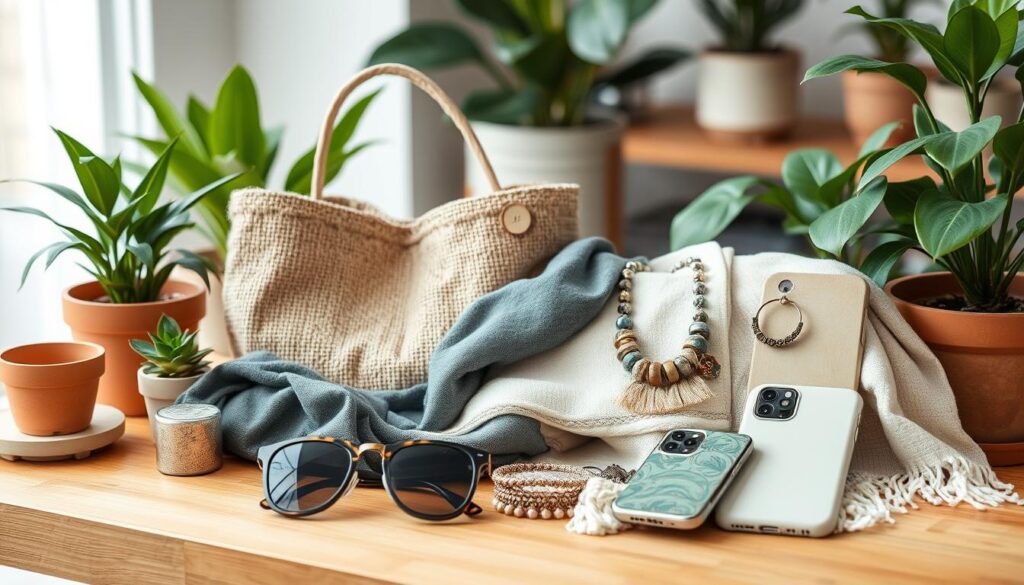
- Reusable bags from organic cotton or recycled materials
- Sustainable watches from recycled metals or sustainable wood
- Eco-friendly jewelry from recycled materials or conflict-free diamonds
Choosing eco-friendly accessories and adding sustainable fashion for daily use to our lives helps the environment. It also keeps us looking good and on-trend. Every small change we make matters, and accessories are a great place to begin our sustainable journey.
Tips for Building an Eco-Friendly Wardrobe
Creating a sustainable fashion sense is key. Building an eco-friendly wardrobe is a big step. We can do this by using simple, effective strategies.
Quality is essential in an eco-friendly wardrobe. Buying a few, well-made, sustainable pieces is better. This way, we avoid buying too much and wasting resources.
Buying Secondhand: Thrifts and Vintage Shops
Thrift stores and vintage shops are great for finding unique items. They help us reduce waste and support sustainable fashion. Plus, we get to express our style with one-of-a-kind pieces.
Capsule Wardrobes: Quality Over Quantity
A capsule wardrobe is another smart choice. It means having a few, high-quality pieces. This way, we can make many outfits without wasting resources.
Using these tips can greatly help the environment. Whether it’s buying secondhand or choosing a capsule wardrobe, every choice matters. We’re not just reducing waste; we’re also making fashion more conscious and responsible.
The Role of Certifications in Eco-Friendly Fashion
When we choose sustainable fashion, eco-friendly certifications are key. They ensure our clothes meet environmental and social standards. Look for GOTS, Oeko-Tex, and Bluesign to know your clothes are stylish and green. For more on Oeko-Tex, check out this resource.
Knowing about eco-friendly certifications helps us shop smart. Key ones to spot include:
- GOTS (Global Organic Textile Standard)
- Oeko-Tex
- Bluesign
These labels mean products follow sustainable fashion standards. They check for organic materials and fair labor. Choosing certified clothes supports a greener fashion world. For a detailed guide on sustainable fashion, visit this website.
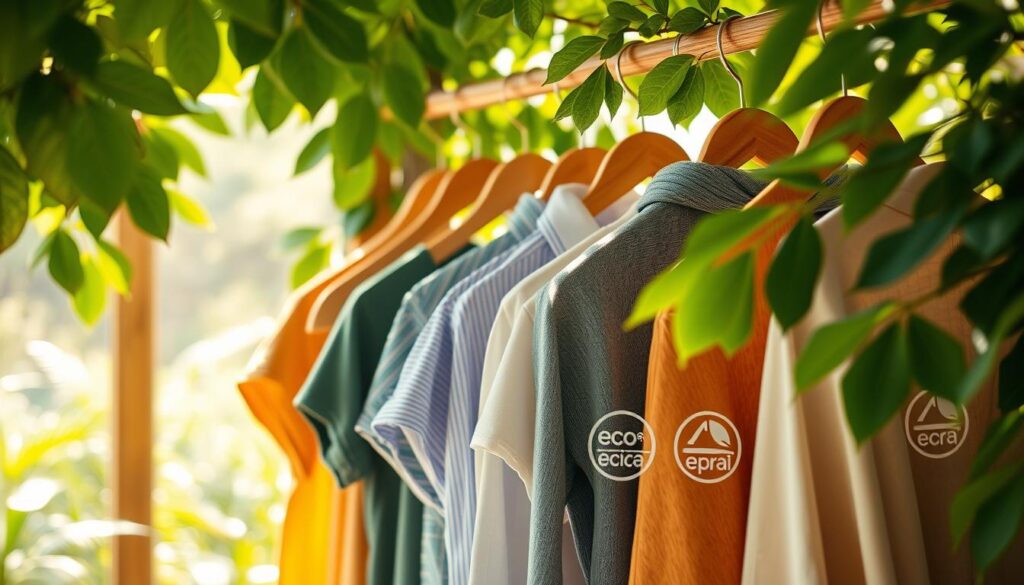
By focusing on eco-friendly certifications and sustainable fashion standards, we help the fashion world be better. As shoppers, we can push for change by choosing wisely and backing eco-conscious brands.
Caring for Your Eco-Friendly Clothes
Buying eco-friendly clothes is just the start. To really help the planet, we need to take care of them right. This means washing them in ways that make them last longer and reduce waste.
Washing your clothes in cold water and using mild detergents is a great start. It keeps the fabric in good shape and is better for the environment. For more tips, check out these eco-friendly fashion tips to help the planet.
Washing Techniques for Longevity
Choosing the right washing techniques is key. Avoid bleach and use gentle cycles. Skipping the dryer is also a good idea. These steps help your clothes last longer and cut down on waste.
Repairing vs. Replacing: A Sustainable Mindset
Thinking about repairing clothes instead of replacing them is important. Learning to fix clothes or finding local tailors can make a big difference. It keeps your clothes out of landfills and helps them last longer.
The Future of Eco-Friendly Fashion
We’re excited about the future of sustainable fashion. It’s full of promise for innovation and growth. Eco-friendly innovations are popping up every day. The industry is set for big changes, from new materials to how things are made.
Some key areas leading this change include:
- Investment in research and development for eco-friendly materials
- A growing number of conscious consumers demanding sustainable fashion
- Brands changing their ways to meet this demand
As people learn more about the impact of their clothes, the industry is responding. Eco-friendly innovations are becoming more common. They’re not just sustainable but also high quality and perform well. We’ll see more sustainable fashion choices in the future.
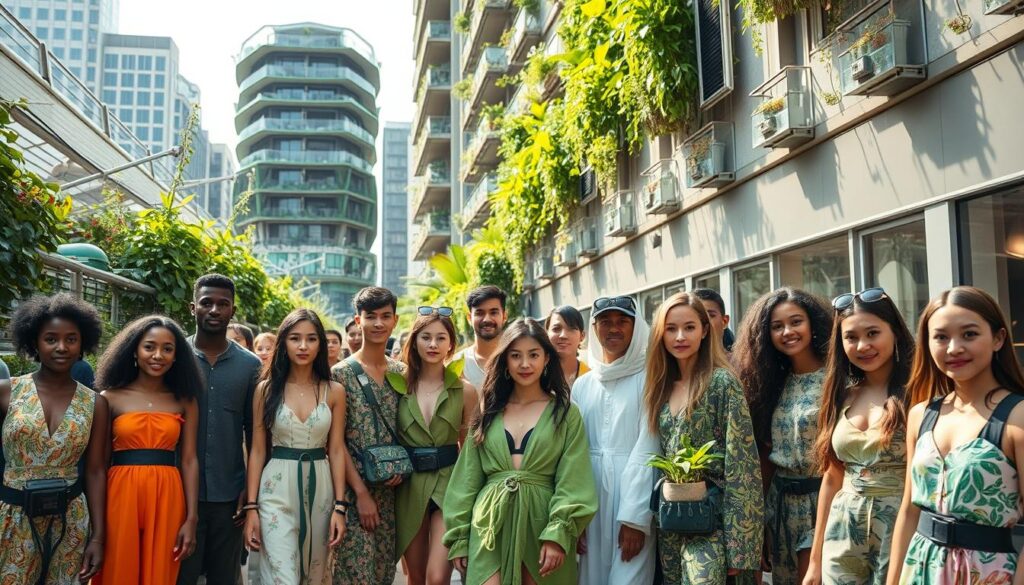
This change comes from understanding the need for eco-friendly innovations. It’s about reducing the fashion industry’s environmental impact. As we move forward, expect more brands and consumers to focus on sustainability.
| Area of Innovation | Description |
|---|---|
| Materials | New, eco-friendly materials are being developed to reduce the environmental impact of clothing production. |
| Production Methods | Brands are investing in research and development to create more sustainable production methods. |
| Consumer Awareness | Consumers are becoming more aware of the environmental and social impact of their clothing choices, driving demand for sustainable fashion. |
How to Make Eco-Friendly Fashion Choices
Making eco-friendly fashion choices is a journey. It starts with learning and being aware. We can find out about brands that care about the planet and see how they work.
This knowledge helps us make better choices for our clothes. We can find new brands and learn how to dress sustainably. Talking to others who care about the environment can give us great tips and news.
Empowering Through Education
Learning is the first step to eco-friendly fashion. We can look into brands that teach about sustainable fashion. This way, we can pick clothes that match our values.
Engaging with Eco-Friendly Communities
Being part of eco-friendly groups is very helpful. We can meet people who think like us, learn how to dress green, and keep up with new eco-friendly clothes. Together, we can make fashion better for our planet.
Here are some ways to join eco-friendly communities:
- Go to sustainable fashion events
- Join online forums and groups
- Help out in local projects and workshops
By doing these things, we can help the fashion world be more green. We can also teach others about sustainable fashion.
Fun Ways to Incorporate Eco-Friendly Fashion
Embracing eco-friendly fashion can be fun and rewarding. We can add a unique touch to our wardrobes with DIY upcycling projects. By repurposing old clothes, we create one-of-a-kind pieces that show our style and care for the planet.
DIY Upcycling Projects
Upcycling lets us turn old clothes into new, stylish items. For example, we can make a tote bag from an old t-shirt or a modern skirt from a thrifted dress. These projects are creative and help reduce waste by giving old clothes a new life.
Sustainable Fashion Challenges and Events
Joining eco-friendly fashion challenges and events is another great way to live sustainably. These activities help us think differently about shopping and discover new brands. They also connect us with others who care about eco-friendly fashion.
By taking part in these activities, we can make a difference and inspire others. Together, we can make fashion more sustainable, one outfit at a time.

